During the Black Friday Cyber Monday (BFCM) weekend in 2022, Shopify merchants hit $7.5 billion in sales.
With more than 52 million shoppers turning to Shopify merchants during BFCM, and 73% of online sales coming from mobile commerce, the numbers show there is ample opportunity to make the most of the year’s busiest shopping event. Are your team and website ready for the boost in traffic and transactions during the holiday season?
Here are 17 Black Friday marketing ideas to get you started.
Black Friday is a major marketing event for online brands. It’s a chance to take advantage of heightened consumer interest, and an opportunity to experiment with new marketing and advertising tactics.
To get geared up for the next Black Friday season, here’s a compilation of 17 strategies you can use to boost traffic and sales through your ecommerce store.
1. Run deep Black Friday deals
A “deep” Black Friday deal involves a major discount that attracts shoppers because it’s greater than normal. While Shopify data shows the average merchant discounted products by 14.3% in 2022, Chase Fisher, founder and CEO of Blenders Eyewear recommends going beyond the average to stand out. “You can’t go into Black Friday and put 15% off, 20% off and expect to do well,” Chase says. “Everything comes down to your offer—it’s the one time out of the year you can lower your prices without feeling like you’re losing brand integrity. Make sure your offer is compelling, no matter what.”
Blenders has been known to go deep on its Black Friday offers, with 55% off on all sunglasses sales and buy one, get one free offers. On past Cyber Mondays, the ecommerce team has even marked down snow goggles by 40%. That’s why the company boasted sales surges of up to 10 times that of its previous year’s Black Friday Cyber Monday performance.
Meanwhile, Nik Sharma, marketing consultant and DTC (direct-to-consumer) expert, emphasizes implementing strategies that increase your average order value. “My favorite offer for Black Friday is a high discount combined with a high average order value (AOV) offer,” Nik says. “For example, if you’re selling a $20 product, try to build a bundle that sells for a total of $100 after a 30% to 40% discount. When you increase the AOV, you can afford to give a bigger discount on the product.”
But instead of discounting your entire store, Greg Zakowicz, senior ecommerce expert at Omnisend, recommends taking a page from Blenders Eyewear and offering category-specific sales. “The challenge for retailers is that, as sales start earlier and earlier, it puts increased pressure on them to deliver the discounts they have trained their customers to expect,” says Greg.
Using category-specific sales can accomplish several things, including:
-
Generating incremental sales with higher margins
-
Engaging email subscribers and visitors for longer
-
Helping you better manage your inventory, ordering, and future promotions
2. Go all in on VIP customers
Don’t be afraid to go even bigger withdiscounts and offers for your best, most loyal customers. For its VIP email customers, TANIT Botanics gives early bird access to its Black Friday sale, branded as Change Friday. The brand offers special perks like gift boxes, bundled deals, and sitewide savings of up to 25% with a special code.
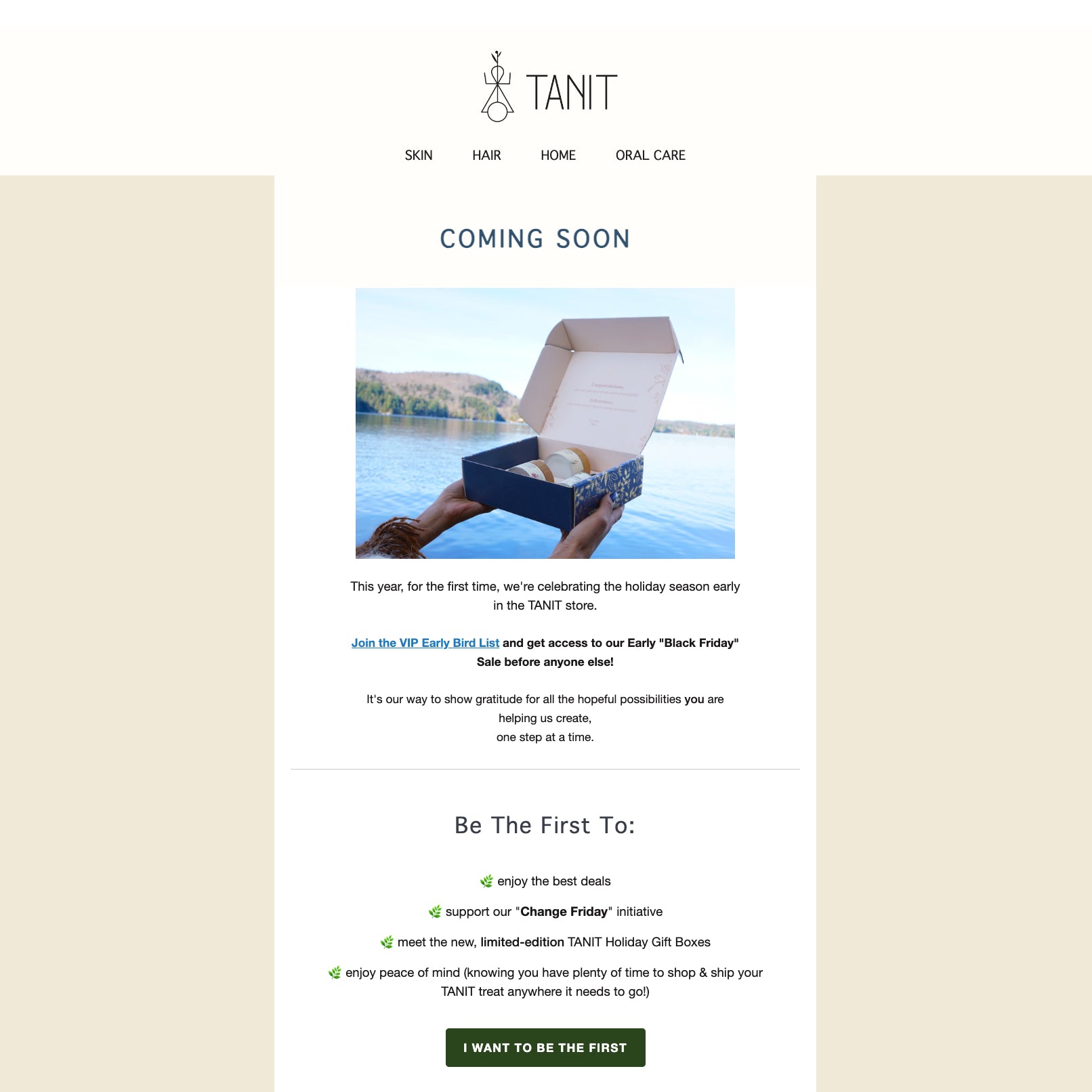
Via TANIT
VIP customers tend to be the biggest spenders and the most engaged, so brands can benefit from segmentation of their top-tier group for its customer lists. According to Adobe, it’s the top 1% of a brand’s customers that typically spend five times more than the rest. Using VIP emails can be an effective strategy to reach your most loyal customers at minimal cost.
“The MVC [most valuable customer] segment is typically your subscribers, loyalty/rewards members, ambassadors, general high lifetime value [LTV] customers, or maybe even your first 1,000 customers,” says Nik. “You can use tools like Postscript, Klaviyo, or Yotpo to make these emails feel personal with very little manual work on your end.”
The TANIT example combines a sense of exclusivity with “Join the VIP Early Bird List” copy and a “Be the First” call to action (CTA), which creates a sense of urgency for shoppers to sign up. Together, these two tactics aim to boost conversions from a single email send.
3. Create a master plan for Black November
Black November is the lead-up to Black Friday, when many retailers begin promoting their sales. So, pacing your promos throughout that time is important to keep new and existing customers engaged.
Note that ad buyers are starting to run Black Friday and Cyber Monday deals earlier on platforms like Facebook and Instagram. It gives them time to test and learn, figuring out which creative assets work best, so they can ramp up spending during the four-day shopping weekend.
To avoid customers experiencing burnout from your Black Friday ad messaging, adopt strategies that maximize your return on investment (ROI). Additionally, consider how to capitalize on your growing social audience as part of your integrated Black November plan.
Here are a few key dates to include in your Black November plan for 2023:
-
Singles’ Day (China’s biggest shopping day of the year): November 11
-
Thanksgiving: November 23
-
Black Friday: November 24
-
Cyber Monday: November 27
Knowing key retail holiday dates are critical if you have both a North American and international customer base. Keep in mind:
-
Black Friday may be known as the biggest day for discounts, but you should begin your promotions much earlier, because many retailers start “leaking deals” through advertising in late October and early November, then nurture through email and social media to drive sales.
-
Alibaba, China’s largest ecommerce retailer, in recent years generated as much as
$76.5 billion in sales during Singles’ Day celebrations. Remember to develop a separate strategy for that day, and the related two weeks of festival events.
Examples of Black Friday strategies that can help you gain ecommerce traffic include:
-
A Black Friday buzz-building campaign. The campaign can include a countdown, deals, and specials that use ads, emails, and social media leading up to the event.
-
Sneak peeks on door crashers. Doorcrashers, or doorbuster deals, are specials that run for a limited time, starting at early hours or at opening. You can also offer other sales that will go live during the weeks leading up to and on Black Friday.
-
A coordinated promotional strategy. Consider a promo strategy that spans all online channels—websites, emails, and social—to maximize impact on the day of your sale.
-
An influencer and micro-influencer engagement strategy.
Leverage influencer marketing to boost word of mouth about special offers.
-
Post–Cyber Monday deals. Use, extended sale offers for last-minute online shoppers,emphasizing shipping dates and gift wrapping, throughout December.
Altitude Sports extended its Cyber Monday deals, offering up to 40% off to customers—with bonus savings for those who joined as a brand member.
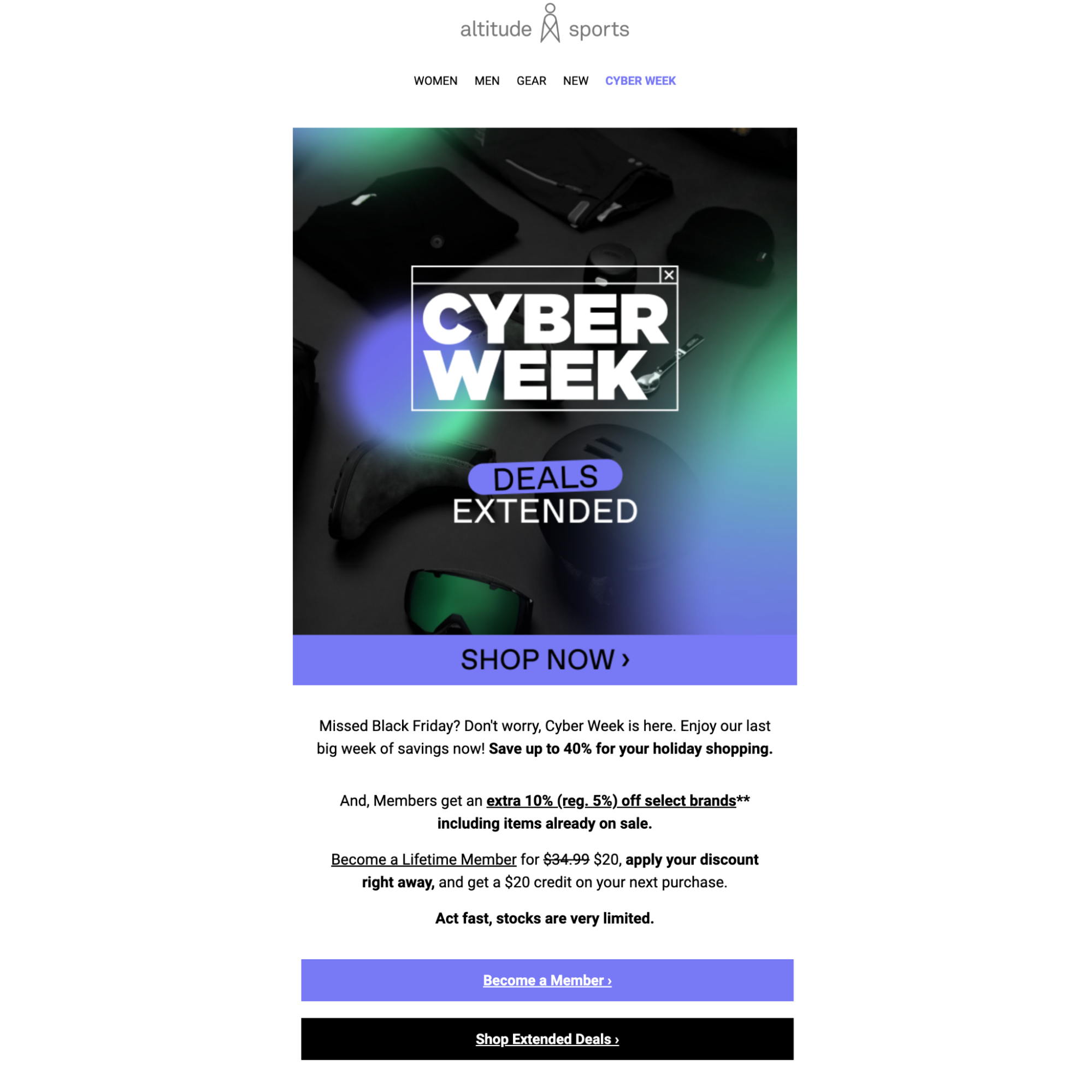
Via Altitude Sports
4. Build anticipation through social media
Sales attributed to social commerce channels hit a record $58.1 million in 2022—making social media a top channel to leverage during the lead up to Black Friday. Strengthen customer engagement by making an emotional connection with customers—try using inspiring imagery and highlighting positive testimonials on popular social media platforms. Then, when Black Friday hits, use email marketing to drive immediate results.
For example, leading up to Black Friday 2022, Blenders started highlighting its BOGO (buy one, get one) deals, using the hashtag #blackfriday. Content creators and influencers promoted the sale through Instagram.
Simultaneously, Blenders was building buzz on TikTok, while promoting the hashtag #blendfriday and the upcoming new drops timed to Black Friday. This multichannel approach allowed Blenders to speak to their followers and prospects in multiple places, and successfully tease the upcoming sale before it hit.
5. Segment your emails before and during Black Friday
Email is still a staple of Black Friday Cyber Monday sales. Personalization by audience segment is an important tactic to leverage.
Marketing automation platform Klaviyo recommends identifying the following five key segments based on their motivation, willingness to spend, and level of urgency—and customizing marketing messaging for each:
-
Deal hunters
-
Last-minute shoppers
-
VIPs
-
Window shoppers
-
Impulse buyers
Additionally, retailers often identify these segments in need of re-engagement:
-
Email ignorers
-
Haven’t purchased
-
Almost purchased
For those who have almost purchased, pushing them toward checkout is key. For example, Ivory Ella sent an email out to only those customers who had received their morning email but had not opened it or placed an order that day.
For email ignorers, try enticing them with free shipping or a complimentary gift with purchase. Ursa Major sent a “free shipping plus a free bar of soap” offer at 7 p.m. the day after Black Friday to convert subscribers who didn’t open an email on the day of the sale.
6. Make sure your site can handle a surge in traffic
All of the effort you put into your Black Friday marketing campaigns then begs the question: Can your site handle the surge? The potential to lose or gain millions in sales on Black Friday can hinge on your ecommerce platform’s reliability.
Despite SweetLegs’ best efforts to make its ecommerce site ironclad and uncompromisable by spending thousands extra each month on better servers, a Black Friday crash cost the company six figures in lost sales.
“There was just an error page: ‘Try back again later,’ ” says Chris Pafiolis, founder of SweetLegs. “Too many requests. Too many people. It just choked.”
After replatforming in just 30 days, SweetLegs had its best Black Friday and Cyber Monday ever. The company launched a 50%-off promotion for the duration of the sale, and the site stayed up the entire time.
Whether or not you need to replatform right now, it’s good to have a backup strategy. Install an uptime monitor like UptimeRobot or Pingdom to notify you when your website experiences downtime. That way, you can react quickly and lean on your platform support team to swiftly resolve the issue and minimize the loss of customers
Site crashes are a huge turn-off, but a slow-loading site can be equally irritating for customers.Every second a page takes to load can up the site’s bounce rate. Therefore, slower ecommerce sites will likely lose customers to a faster competitor’s site. To improve your Black Friday ecommerce site speed and performance, review the optimization tips for Shopify ecommerce sites.
Additionally, PageSpeed Insights is a Google Labs tool that personalizes suggestions to improve your site performance and speed. It calls out elements like CSS and JavaScript that can slow down your site’s loading times.
7. Optimize for mobile-first buying
US consumers spend 276 minutes (or nearly five hours) on their mobile phones daily. If your site isn’t optimized for a seamless mobile commerce experience, then you risk falling behind and losing customers to competitors.
While some customers still shop via desktop and browse by smartphone, during the 2022 Black Friday Cyber Monday, Shopify merchants saw mobile transactions account for 73% of all sales, compared to 27% on desktops.
You can boost your likelihood for mobile shopping success by keeping pace with mobile commerce trends, improving your site navigation and website speed, and offering one-click purchases to mobile-first customers.
8. Improve your website’s navigation
Improving your site’s search functionality will help customers to navigate your site quickly to find holiday gifts. Alternatively, 70% of shoppers will abandon a site because of a poor on-site search or user experience. There are a couple of ways to improve navigation—one is enhance search, and the other is to lean into navigation designs that are familiar to customers.
Implement predictive search
To prepare for the holiday rush, find a predictive search tool that offers:
-
Real-time analytics. To help you understand trends and performance with unlimited real-time analysis.
-
Instant, accurate search results. To retain customers who are almost twice as likely to convert when using site search.
-
Storefront customization flexibility. To use search as an extension of your brand by controlling overall search styling.
Mimic offsite platforms onsite
MVMT watches features an Instagram gallery embedded at the bottom of its site to help mobile device users quickly browse its product line. It also encourages customers to visit its Instagram and see social proof of customers’ love of MVMT products.
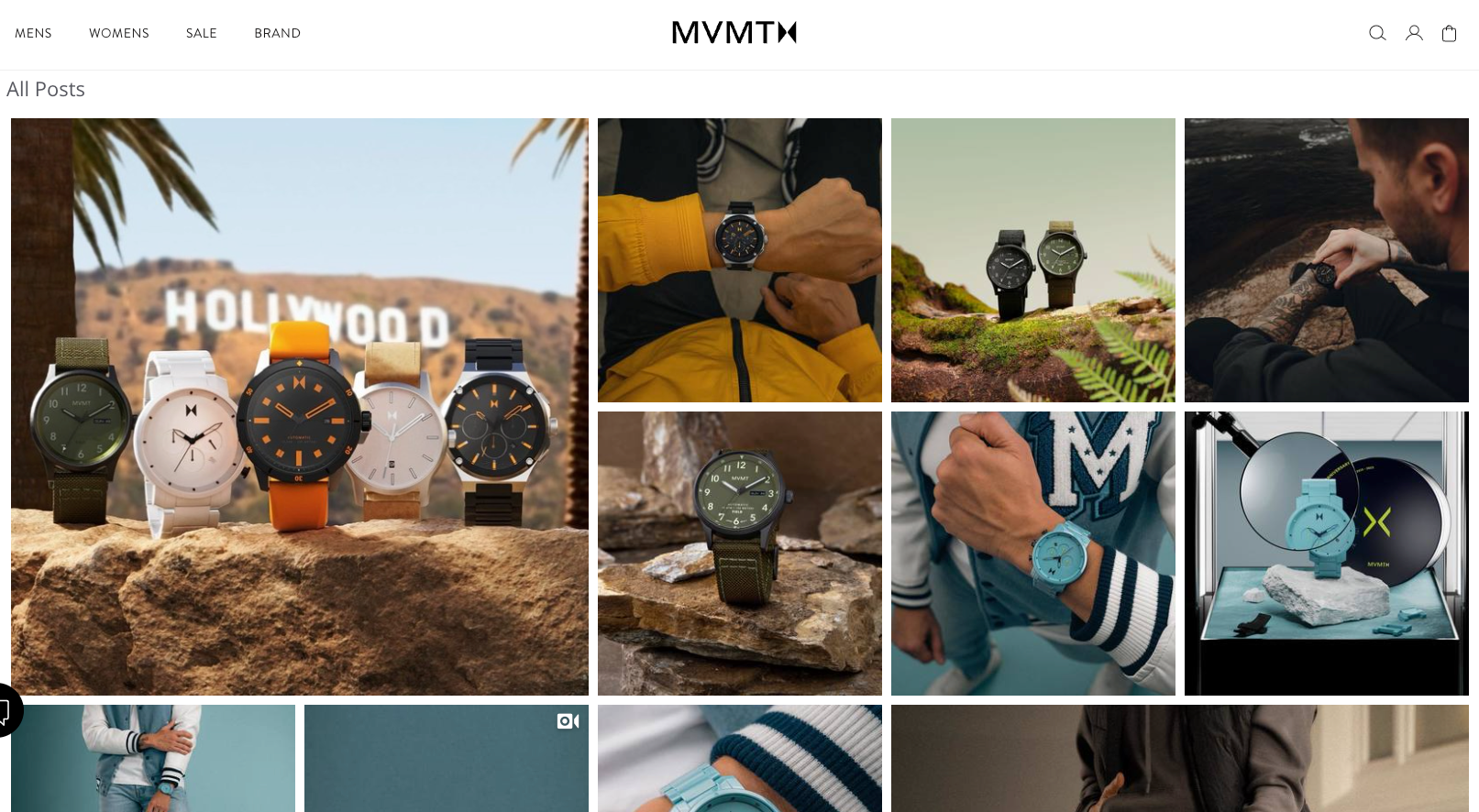
Via MVMT
Users can also click and scroll through MVMT’s latest Instagram posts, view more images and pricing, and click on a single Add to Cart button—without ever leaving the site. Additionally, MVMT leverages a host of traditional offsite multichannels and mobile-first elements like:
-
Full-screen product images
-
User-generated content and reviews
-
Additional “Shop Insta” visuals
All of these elements make for an easy browsing experience that engages and converts customers.
9. Simplify the checkout experience
The average person in the US spends more than $300 each month on impulse purchases. To boost impulse purchases on Black Friday, reduce the on-site barriers to buy.
One-click buying enables customers to purchase items with a single click, with the customer’s payment information stored in a secure mobile wallet. Businesses can enable one-click purchases by offering Shop Pay, the best-converting checkout on the internet, which lets customers save their email address, credit card, and shipping and billing information.
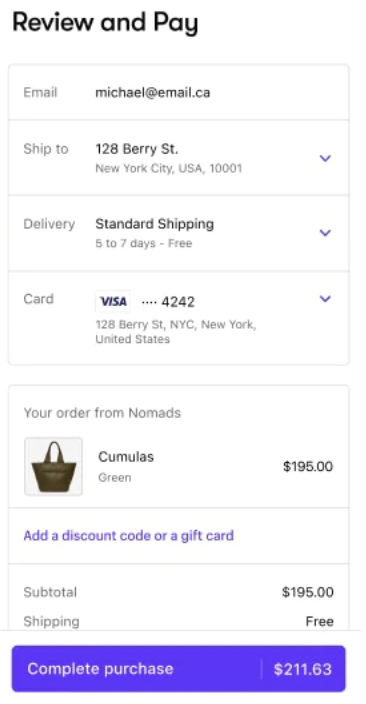
Via Shop Pay
You can also add dynamic checkout buttons to increase mobile transactions. Once a customer has selected their preferred payment method, Shopify’s back end remembers their choice and automatically presents that payment button on all future visits.
Also, you can speed up the checkout process by displaying those buttons directly on product pages—giving customers the option to buy immediately or add the item to their cart.
10. Kill the coupons and codes
Customers have come to expect coupons and special Black Friday codes. But having to remember and input a code can create friction during the checkout process.
Shopify merchants can also reduce checkout friction using automatic discounts. You can create and automatically apply discounts to a customer’s cart, without a discount code. It offers fast, flexible promotions using fixed, percentage, or buy-X, get-Y discounts to streamline the checkout process.
Using automatic discounts on Black Friday, you can:
-
Boost conversions, Discounts are automatically shown at cart and checkout.
-
Have more flexibility with promotions. Customize discounts by adding a minimum purchase amount or quantity of items. Set conditions to only apply the discount to specific collections or products.
-
A/B test automatic discounts.
Use A/B testing to identify the best automatic discount thresholds to boost sales and conversion rates. Then, create a more complex, personalized experience with Shopify Scripts.
Implementing automatic discounts can be easier with the help of Shopify Scripts. Using the Script Editor app, you can create scripts that run each time a customer adds items to their cart. These scripts can have many uses, from discounting products with specific tags to running promotions such as “buy 2, get 1 free,” or a free gift with purchase.
11. Rescue abandoned carts by any means necessary
Shopping cart abandonment is still high in online retail: an astonishing 70.19%. While email marketing is still a strong channel to rescue abandoned carts, leading brands reach out on other channels, like social media, to re-engage customers.
For example, Pura Vida Bracelets uses ShopMessage for automation through Facebook Messenger. ShopMessage helps you:
-
Recover abandoned carts
-
Build a Messenger subscriber base
-
Trigger personalized conversations by onsite behavior
If a customer views a product on the Pura Vida website but doesn’t buy right away, the company can automatically offer a discount using ShopMessage. It takes one click for customers to return to the checkout and see their cart reconstructed, with the discount automatically applied.
ShopMessage has helped Pura Vida generate:
-
A 26% clickthrough rate
-
A 10% lift in revenue from subscribers logged into Facebook
12. Leverage automations
While Black Friday can be a significant source of revenue for many ecommerce businesses, it can also be a source of stress. Leveraging automation can help, as it saves you the guesswork about which workflows would work best for your site, and saves you the time of creating them from scratch. Automation also lessens the risk of human error.
Ecommerce automation tools like Shopify Flow enable you to automate nearly any customer-facing or back-office process you can imagine—from launching new, personalized campaigns to fraud management to low stock alerts. You can also store and execute triggers, conditions, and specific actions, without any coding.
Merchants use Flow to automate high-pressure business tasks for Black Friday and Cyber Monday, such as:
-
Customer service
-
Fraud prevention
-
Design and development requests
-
Merchandising
-
Marketing and advertising
-
Managing inventory
Socks For Living uses ecommerce automation to easily schedule, execute, and monitor events such as sales, product releases, inventory restocks, and content changes. The team usesLaunchpad to automatically roll out and roll back discounts, theme changes, and products. That means, for example, their team doesn’t have to stay up late to post or take down a new sale.
Launchpad’s real-time monitoring tool helped Socks For Living streamline which offers it promoted through email—and to whom—to prevent overlap: If one customer received an offer to buy a product for $15, they wouldn’t later get an offer to buy that same product for $12.
Shopify Flow also offers a library of pre-made workflow templates you can use to automate multiple ecommerce business processes. For example, you can send browser push notifications after a customer makes a second order, create support tickets after a negative customer review, and send a win-back email to “at-risk” customers. All Flow templates can be customized on your own in minimal time.
13. Invest in post–Black Friday loyalty
Incorporating loyalty programs into your Black Friday marketing strategy can pay dividends. That’s because customers who redeem loyalty rewards often spend more than those who don’t. That’s because the psychology of a loyalty program email is completely different than promotional emails:
-
Loyalty emails include rewards that your customers have worked to earn, so they don’t want to lose those points.
-
They’re one of the few emails your customers receive that is 100% personalized.
LoyaltyLion integrates with a number of email service providers (ESPs)—like Dotdigital, Klaviyo, Mailchimp, and HubSpot. So you can automatically enhance customer emails with loyalty information, such as point totals.
Don’t forget to promote rewards in the customer’s cart, as well. Enabling customers to claim loyalty rewards directly from their cart with one click is another way to help grow average order values.
14. Prepare a Black Friday shipping and returns plan
Fast shipping and simple returns are two customer pain points. During BFCM, ecommerce merchants need to have a solid last-minute shipping plan.
Here are two key dates to keep in mind:
December 11, 2023: Green Monday
The concept of “Green Monday” was developed by eBay in 2007 to commemorate its busiest day of last-minute gift shopping. It falls on the second Monday in December, and it’s a critical time to increase your marketing efforts.
December 14, 2023: Free Shipping Day
During Free Shipping Day, ecommerce stores often provide free shipping on all items, and guarantee delivery by Christmas Eve. If your store participates this year, be sure to set clear shipping expectations with holiday shoppers.
You can use one of several Shopify apps to show whether products in a customer’s cart are eligible to ship within a quick time frame. If the products won’t arrive in time, identify them in the cart as shipping separately. You can warn them on the product page or a sales landing page, as well.
For more last-minute shipping ideas, check out Shopify’s holiday shipping and fulfillment strategies or Global Retail Calendar for important holiday shopping dates. Remember: Make finding cancellation, exchange, and return policies on your website an easy, uncomplicated, and seamless process. If a customer decides to return a Black Friday or Cyber Monday gift or purchase and has a poor customer experience, you risk losing both the customer and revenue.
An app like AfterShip Returns can address this customer pain point. You can automatically generate labels, refunds, and emails to save time and enhance your customers’ shopping experience. You can also customize your portal to look and feel like your website. Likewise, create specific Black Friday policies for final sale and discounted items.
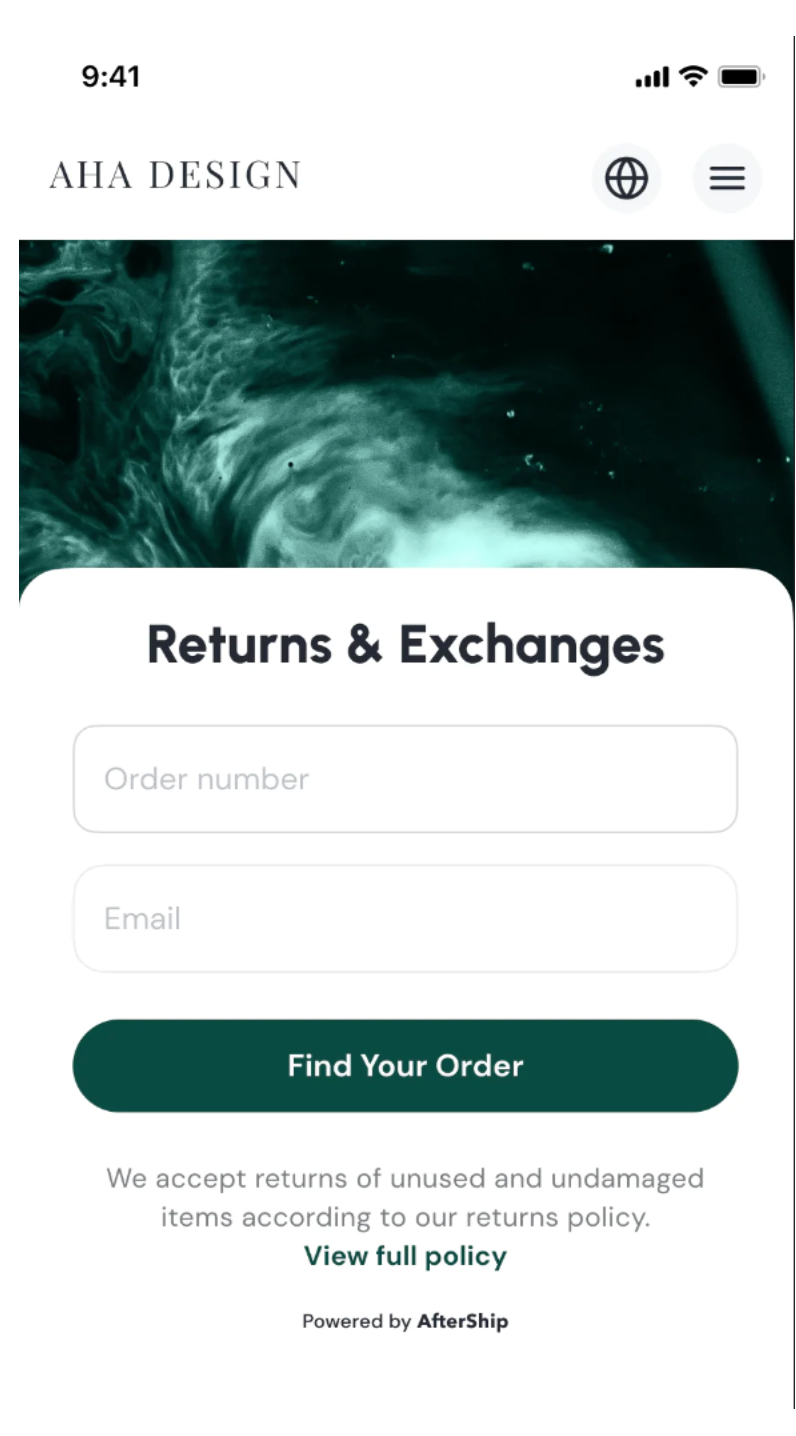
15. Use Amazon as an additional holiday sales channel
Data shows that most people start their product search on Amazon. However, it can be tough to stand out in a sea of Amazon products. That’s why it’s important to allocate some of your advertising budget to Amazon Ads, which offers sellers valuable tools like:
-
Amazon search for product searches
-
Amazon demand-side platform
-
Access to custom advertising experiences
If you’re wondering, “Is selling on Amazon is worth it?” or if you have reservations about working with the ecommerce giant (61% of sellers rank as a top concern the fear that Amazon will take away their seller privileges), think about the shopping strength of Black Friday.
If you think of Black Friday as the Super Bowl of online shopping, then buying ads and listing products to sell on Amazon will help boost awareness for emerging brands. And you can use that exposure to attract satisfied customers to your site long term.
“We realized it is hard for people to have faith in a new brand, especially for something as sensitive as footwear. We really liked the idea of Amazon being able to list our products side by side with the bigger legacy brands. That helped validate our product,” says Nolan Walsh, co-founder at Thursday Boots.
The footwear brand lists some of its bestselling items on Amazon. It then entices repeat business by selling new product launches exclusively on the Thursday Boots site. More Amazon promotional ideas can be found in the Shopify post outlining the multichannel sales benefits of working with Amazon and eBay.
16. Upsell and cross-sell your products
Upselling and cross-selling products can be an effective strategy to bolster your Black Friday sales. Upselling is when you persuade customers to buy a more expensive or upgraded version of items or add-ons to boost the total sale amount. Cross-selling, meanwhile, involves offering shoppers a product that complements their original purchase. Ecommerce companies that employ these types of product recommendation tactics see a 10% to 30% boost in revenue, on average.
To upsell effectively, consider envisioning yourself as the customer. Figure out what might help your customer needs. It’s a softer sales technique that acts more like a friendly recommendation to help them make the right purchase.
Cross-selling can also serve as a reminder for both new and repeat customers who might otherwise leave something behind. For a hypothetical coffee company, this might look like upselling a bigger bag for three dollars more, then cross-selling its coffee filters to increase average order value (AOV).
For both selling techniques, creating sales copy with enticing phrases such as “Add Extras,” “You May Also Like,” or “Others Also Bought” often can persuade people to take action. It’s a softer sales technique that acts more like a friendly recommendation to help them make the right purchase.
17. Adopt a buy now, pay later platform
Capture more holiday sales by offering buy now, pay later (BNPL) options for shoppers.
BNPL is one of the fastest growing ecommerce payment methods and is popular among 25% of Americans. The market size is expected to top $39 billion by 2030, with an annual growth rate of 26% from 2022 to 2030. Brands like Nordstrom, American Eagle, and Morphe have adopted BNPL options on their checkout page.
Shop Pay Installments provides a seamless solution for adding BNPL options, both online and in-store. Customers can either pay in full at checkout or divide their purchase into regular, manageable payments. Merchants using Shop Pay Installments have seen average order value increases of up to 50% and up to 28% fewer abandoned carts.
Other big players in the BNPL space include Klarna and Afterpay—both of which can be added as third-party payment options to your Shopify store.
Preparing your ecommerce store for Black Friday Cyber Monday in 5 steps
Recurring issues—from supply chain demands to order fulfillment to ecommerce platform load times—can have a serious impact on your fourth-quarter earnings. The following steps will help you troubleshoot any unexpected problems.
1. Attempt to replicate the issue
Perhaps someone is having trouble loading the payment information page to add a credit card. Determine what device they’re using, and in which browser and version.
Request screenshots to help your team replicate, or reverse-engineer, the customer’s problem. It might be affecting other customers as well. Also, filter out “local” issues that may not be caused by your site or servers.
2. Determine if it’s an isolated event
Shopify’s Status page can help you determine if this is an isolated event or system-wide issue. Engineers are performing 24/7 monitoring, and will update any unusual problems within minutes of their occurrence.
3. Check third-party apps, themes, and plug-ins
Always test new apps and themes on your “backup” or staging development store first. Then, replicate the exact working conditions, as your live production site should be able to spot problems on the backup version before pushing the problematic app combination to the live site.
4. Lean on Shopify’s priority support
Tap Shopify’s priority technical support. The team can help you test drive the settings for your apps, themes, and other functions. Connect through email, chat, or phone by heading over to Settings > Account page in your admin portal.
5. Plan for stockouts
Don’t forget to plan for stockouts—because you don’t want to wake up the day after Black Friday or Cyber Monday having sold out all inventory without a backup plan. Preparing for the unexpected, like supply chain delays for example, helps ensure you have a contingency plan to protect your business.
A few tips to help avoid going out-of-stock are:
Monitor inventory levels
Your ecommerce platform tools should let you set up inventory tracking to monitor your inventory levels during Black Friday. Look for seasonal trends in your inventory history to prevent stockouts.
If you’re planning a pop-up event during the holidays, or are moving inventory into additional warehouses or spaces:
-
Track and monitor your stock across multiple locations
-
Make inventory adjustments as needed
-
Manage and save time by combining inventory levels with automation tools to replenish products.
Set up inventory management workflows
Shopify Flow can be integrated with the inventory monitoring tools to master your inventory management. It automates most customer-facing or back-office processes, without any coding. You can use the Slack app with Flow: A workflow can send you a Slack message when your inventory levels dip below 10 items.
Ready or not, Black Friday ecommerce is coming
Is your ecommerce site ready for the biggest retail event of the year? While ecommerce holiday sales are expected to continue to climb between 10.3% and 12.8% (or $278 billion and $284 billion), to reap the benefits, brands will have to take a strategic approach.
Plan ahead and consider everything from mobile site speed and performance to integrated online and offline promotions. Your Black Friday strategy should also include shipping and contingency plans for unexpected issues and stockouts.
We wish you a very successful Black November, and we’re here to answer any questions you have leading up to the main event!
Read more
- Decoy Pricing: Secret Strategies Your Competitors Use to Get Customers to Spend More
- 15 Conversion Rate Optimization Strategies from the Top Fashion Brands
- What Is Curbside Pickup (Click and Collect)?
- 4 Strategies to Future-Proof Your Brand
- Harnessing the Power of Feedback Loops to Build a Business Customers Can't Resist
- Designing the New Customer Experience: What Happens After Checkout?
- Microcopy: Near Invisible Text That Converts Visitors to Customers (Even When They Don’t Read It)
- Live Chat: The Most Underused Tool in Your Arsenal
- Cash Flow Management Strategies
- What 1-Click Checkout Can Do for Your Small Business
Black Friday ecommerce FAQ
Does Black Friday affect online shopping?
The pandemic changed the Black Friday shopping holiday slightly. More retailers now promote deals ahead of Thanksgiving week and push more deals online between Black Friday and Cyber Monday.
Is Black Friday or Cyber Monday better for online deals?
Cyber Monday is often cited as having better online deals and discounts. Cyber Monday deals are usually flash sales, offering only the best deals for a day or two and in limited quantities.
How much do sales increase during Black Friday?
Across Black Friday and Cyber Monday weekend, Shopify merchants collectively made $7.5 billion in sales in 2022, up 12% from 2021.
Does Black Friday affect brick-and-mortar stores?
Despite a dip in foot traffic for physical stores during the pandemic, Black Friday retail sales grew 29.8% through mid-afternoon in 2021, versus 2020, according to Mastercard SpendingPulse. Black Friday is a prime day for retailers to see increased foot traffic and sales in their brick-and-mortar stores.


